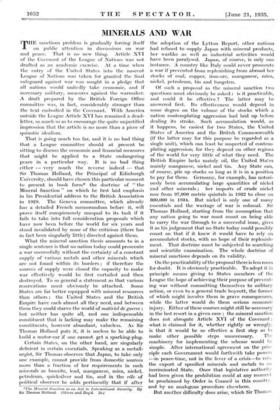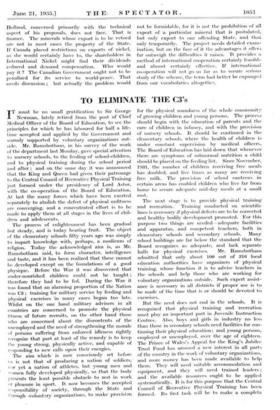MINERALS AND WAR
THE sanctions problem is gradually forcing itself on public attention in discussions on war and peace. That is no new thing. Article XVI of the Covenant of the League of Nations was not drafted as an academic exercise. At a time when the entry of the United States into the nascent League of Nations was taken for granted the final safeguard against war was sought in a pledge that all nations would unitedly take economic, and if necessary military, measures against the warmaker. A draft prepared by the British Foreign Office committee was, in fact, considerably stronger than the text embodied in the Covenant. With America outside the League Article XVI has remained a dead- letter, so much so as to encourage the quite unjustified impression that the article is no more than a piece of quixotic idealism.
That is going much too far, and it is no bad thing that a League committee should at present be sitting to discuss the economic and financial measures that might be applied to a State endangering peace in a particular way. It is no bad thing either — very much the reverse indeed — that Sir Thomas Holland, the Principal of Edinburgh University, should have chosen this particular moment to present in book form* the doctrine of " the Mineral Sanction " on which he first laid emphasis in his Presidential address to the British Association in 1929. The Geneva committee, which, already has a detailed French memorandum before it, will prove itself conspicuously unequal to its task if it fails to take into full consideration proposals which have now been before the world for six years and stand invalidated by none of the criticism (there has in fact been singularly little) directed against them.
What the mineral sanction thesis amounts to in a single sentence is that no nation today could prosecute a war successfully without the certainty of a constant supply of various metals and other minerals which are not found within its 'borders ; if therefore the sources of supply were closed the capacity to make war effectively would be first curtailed and then destroyed. To so general a statement as that various reservations must obviously be attached. Some States are far better equipped with mineral resources than others ; the United States and the British Empire haVe- each almost all they need, and between them they could starve the world of materiel de guerre ; but neither has quite all, and one indispensable constituent that is lacking may make the remaining
constituents, however abundant, valueless. ' As Sir Thomas Holland puts it it is useless to be able to build a motor-car if one cannot get a sparking-plug. Certain States, on the other hand, are singularly deficient in certain essentials. Speaking as a metall- urgist, Sir Thomas observes that Japan, to take only one example, cannot provide from domestic sources more than a fraction of her requirements in such
minerals as bauxite, lead, manganese, mica, nickel, petroleum, quicksilver and tin, and' in the role of political observer he adds pertinently that if after 'The tneral Sanction as an Aid to International Security. 137 Sir Thomas Holland. (Oliver and Boyd. 2s.)'
the adoption of the Lytton Report, other nations had refused to supply Japan with mineral products, her warlike as well as industrial activities would have been paralysed. Japan, of course, is only one instance. A country like Italy could never prosecute a war if prevented from replenishing from abroad her stocks of coal, copper, iron-ore, manganese, mica, nickel, petroleum, tin and tungsten.
Of such a proposal as the mineral sanction two questions must obviously be asked : is it practicable, and could it be effective ? The latter may be answered first. Its effectiveness would depend in some degree on the volume of the stocks which a nation contemplating aggression had laid up before dealing its stroke. Such accumulation would, as it happens, be easiest for two States, the United States of America and the British Commonwealth (if the latter may for this purpose be regarded as a single unit), which can least be suspected of contem- plating aggression; for they depend on other regions of the world for very little of what they need. The British Empire lacks mainly oil, the United States mainly manganese, nickel and tin. Any State can, of course, pile up stocks so long as it is in a position to pay for them. Germany, for example, has notori- ously been accumulating large quantities of nickel and other minerals ; her imports of crude nickel rose from 97,000 metric quintals in 1932 to close on 300,000 in 1934. But nickel is only one of many essentials and the wastage of war is colossal. Sir Thomas Holland, starting from the assumption that any nation going to war must count on being able to carry the war through to a successful issue, gives it as his judgement that no State today could possibly count on that if it knew it would have to rely on accumulated stocks, with no hope of their replenish- ment. That doctrine must be subjected to searching and scientific examination. The whole doctrine of mineral sanctions depends on its validity.
On the practicability of the proposal there is less room for doubt. It is obviously practicable. To adopt it in principle means, giving to States members of the League the hope of achieving their purpose of prevent- ing war without committing themselves to military action; or even to a general trade boycott, the former of which might involve them in grave consequences, while the latter would do them serious economic injury. Either of these courses might still be necessary in the last resort in a given case ; the mineral sanction does not abrogate Article XVI of the Covenant ; what is claimed for it, whether rightly or wrongly, is that it would be so effective a first step as to make other possible steps unnecessary. The machinery for implementing the scheme would be
simple. After international agreement on the prin- ciple each Government would forthwith take powers —in peace-time, not in the fever of a crisis—to veto the export of specified minerals and metals to an incriminated State. Once that legislative authority had been given the prohibition could at any moment be proclaimed -by, Order in Council in this. country, and by an analogous 'procedure elsewhere. - But another difficulty-does arise, which Sir Thomas
Holland, concerned primarily with the technical aspect of his proposals, does not face. That is finance. The minerals whose export is to be vetoed are not in most cases the property of the State.' If Canada .placed restrictions on exports of nickel, as she would certainly have to, the shareholders in International Nickel might find their dividends reduced and demand compensation. Who would pay it ? The Canadian Government ought not to be penalized for its service to world-peace. That needs discussion ; but actually the problem would
not be formidable, for it is not the prohibition of all export of 'a -.particular mineral that is postulated, but only export to one offending State, and that only temporarily. The project needs detailed exam- ination, but on the face of it the advantages it offers far outweigh the difficulties it raises. It provides a method of international cooperation certainly feasible and almost certainly effective. If international co-operation will not go so far as to secure serious study of the scheme, the term had better be expunged from our vocabularies altogether.









































 Previous page
Previous page